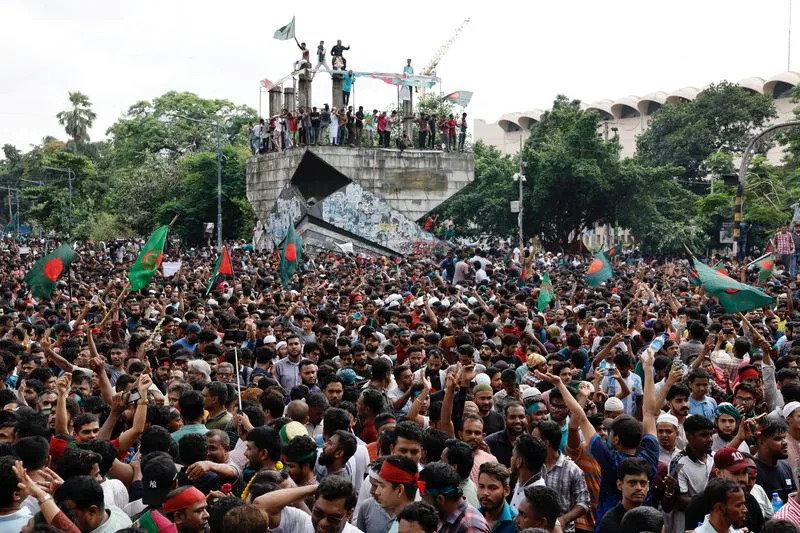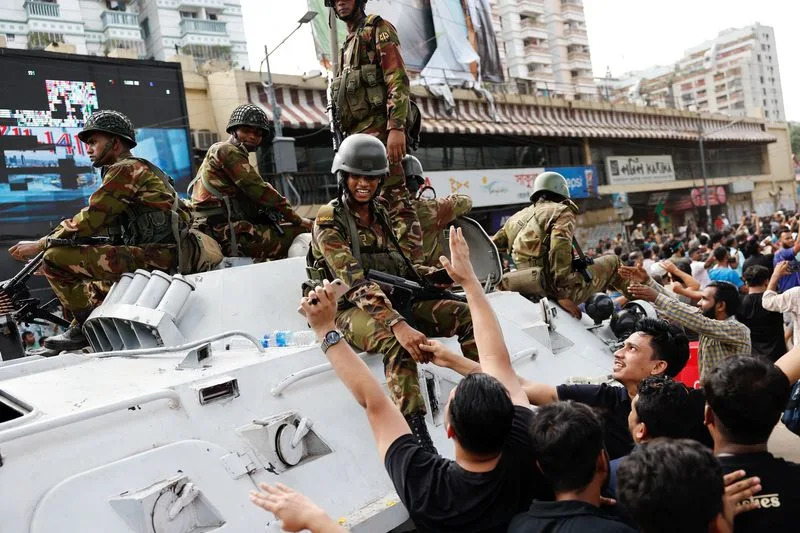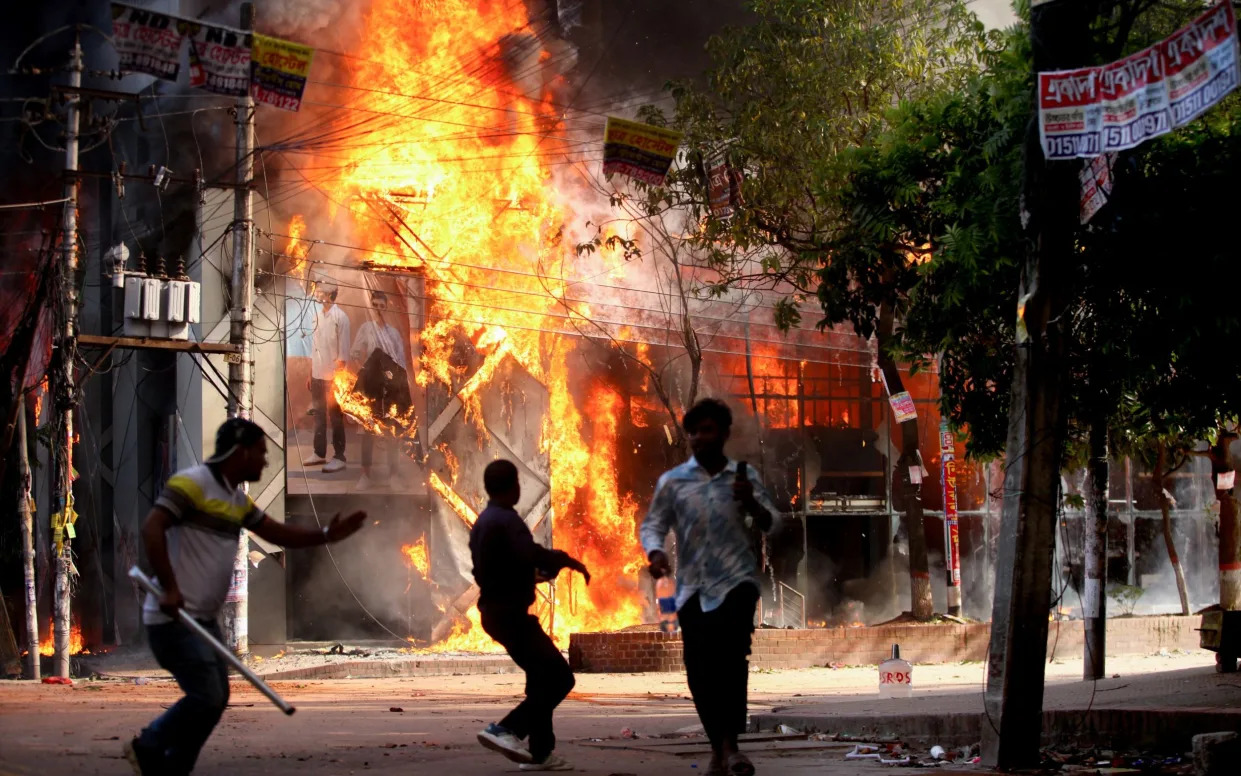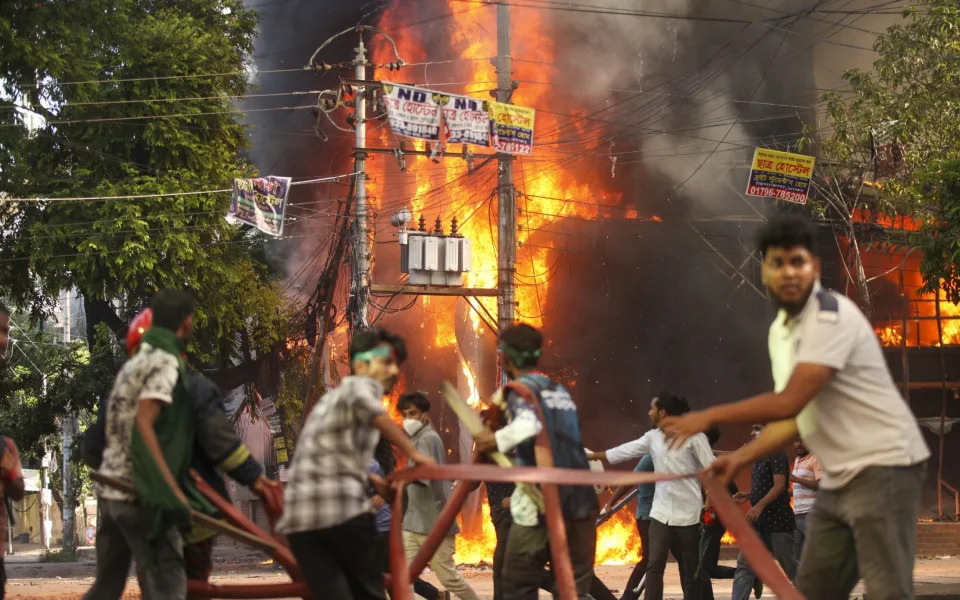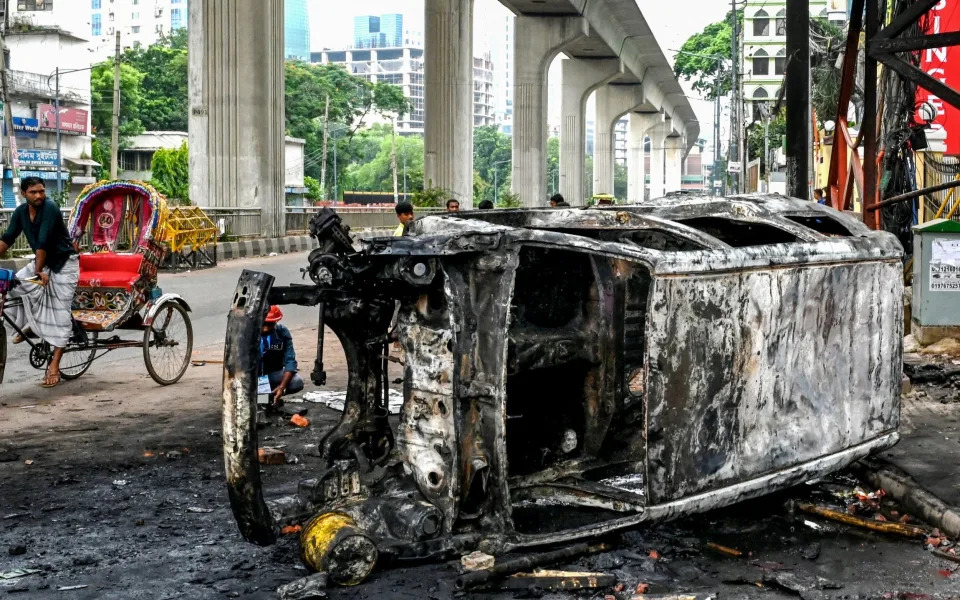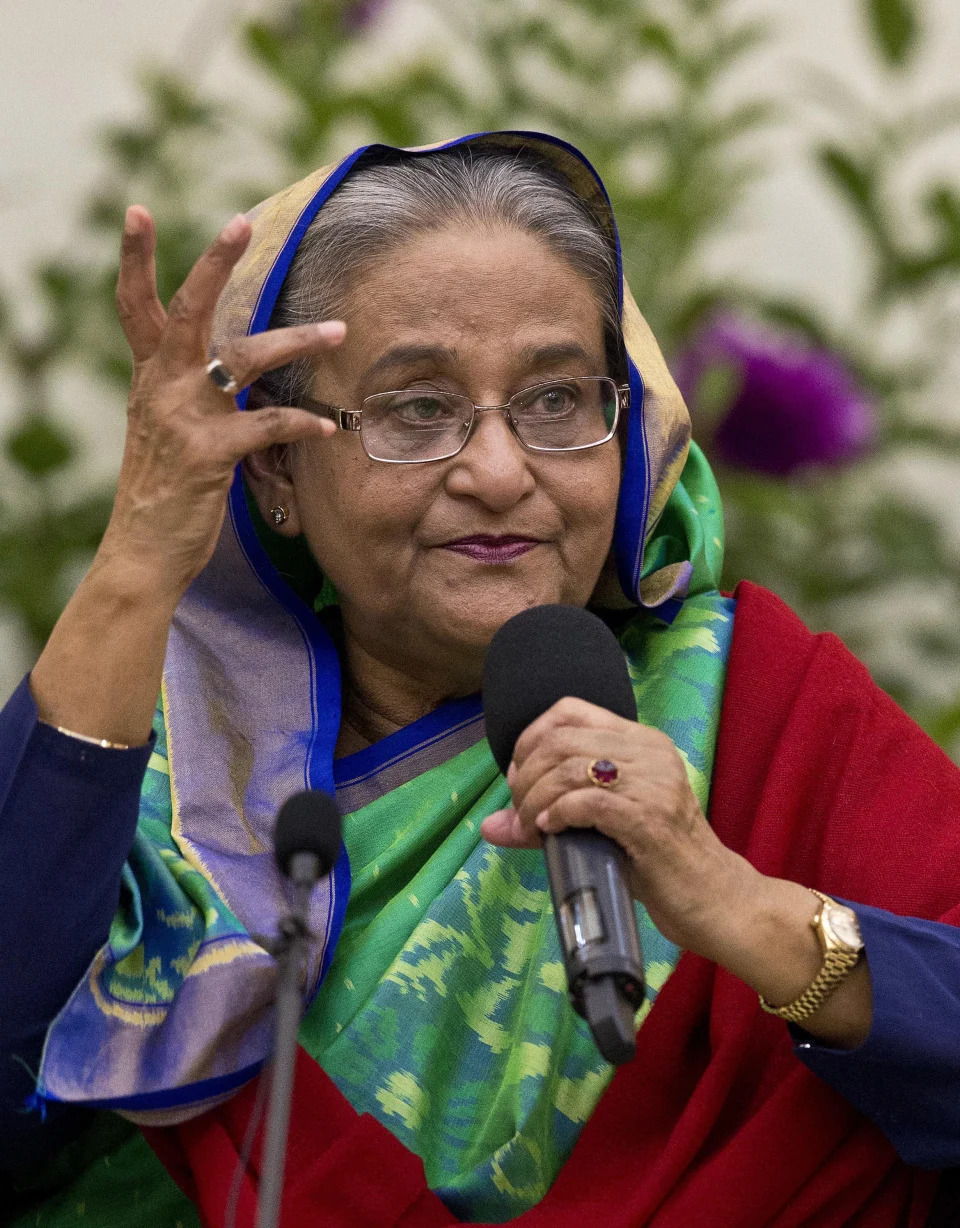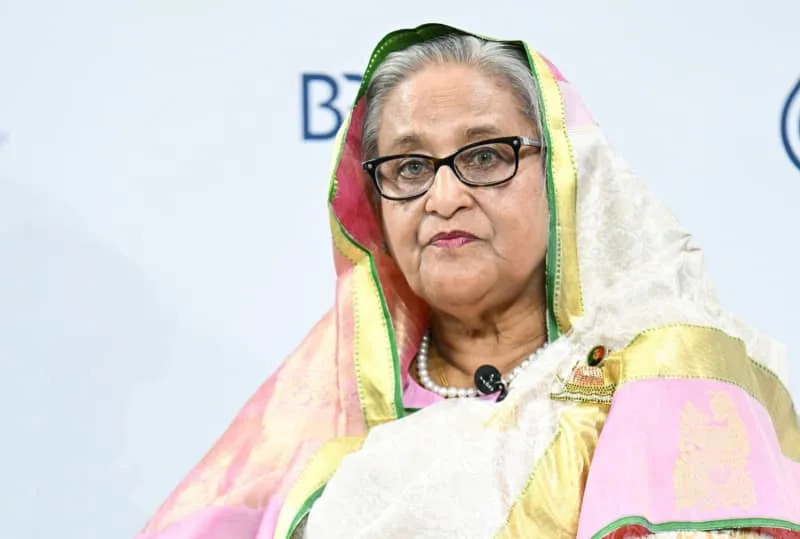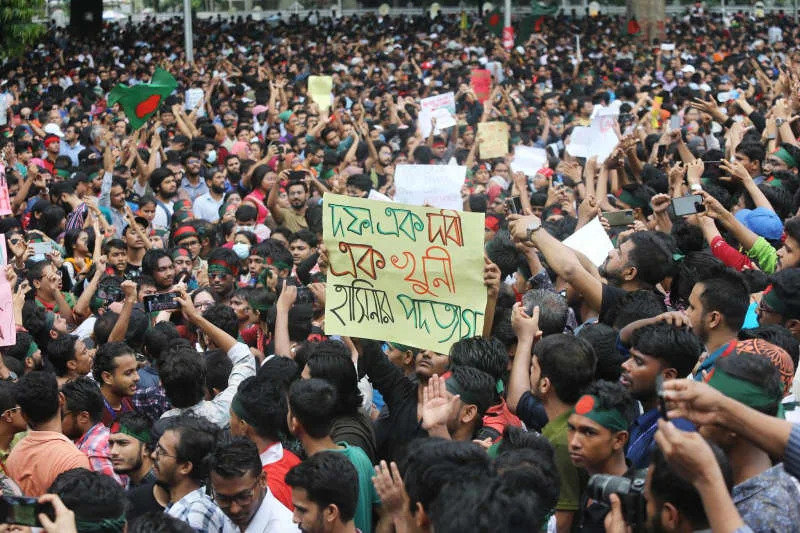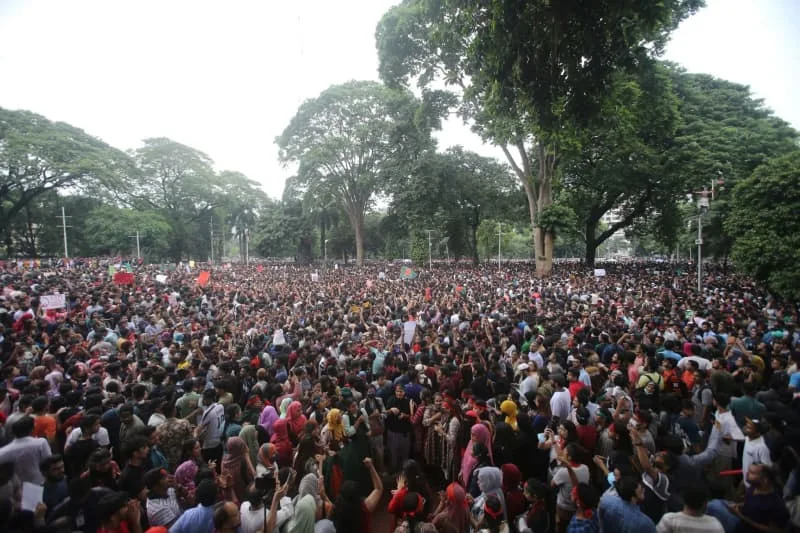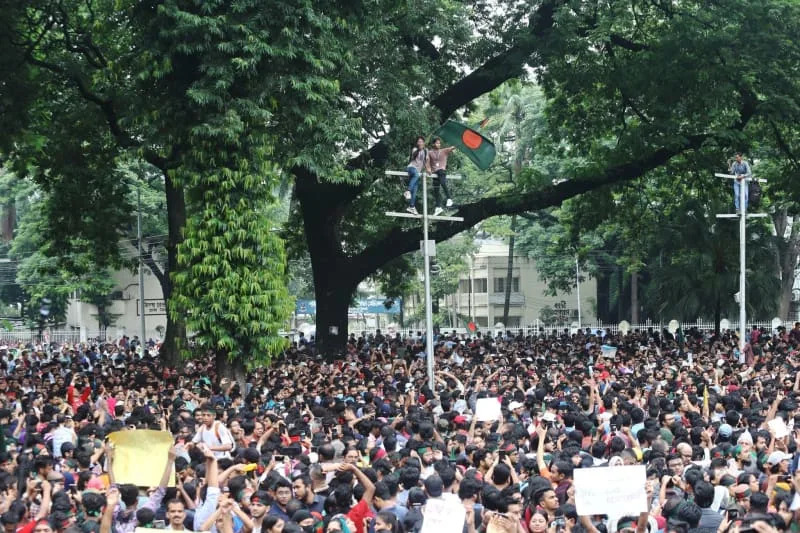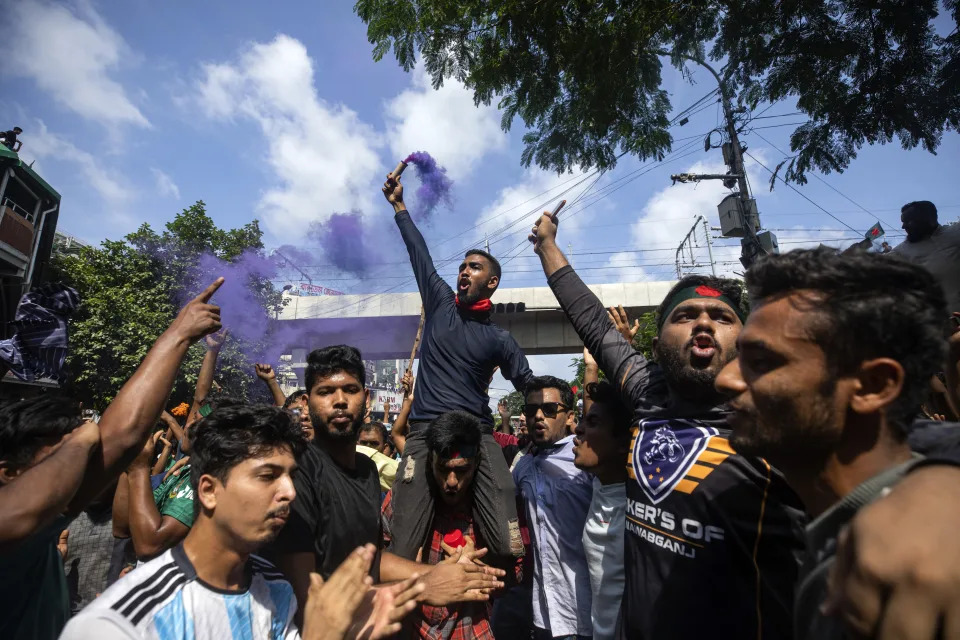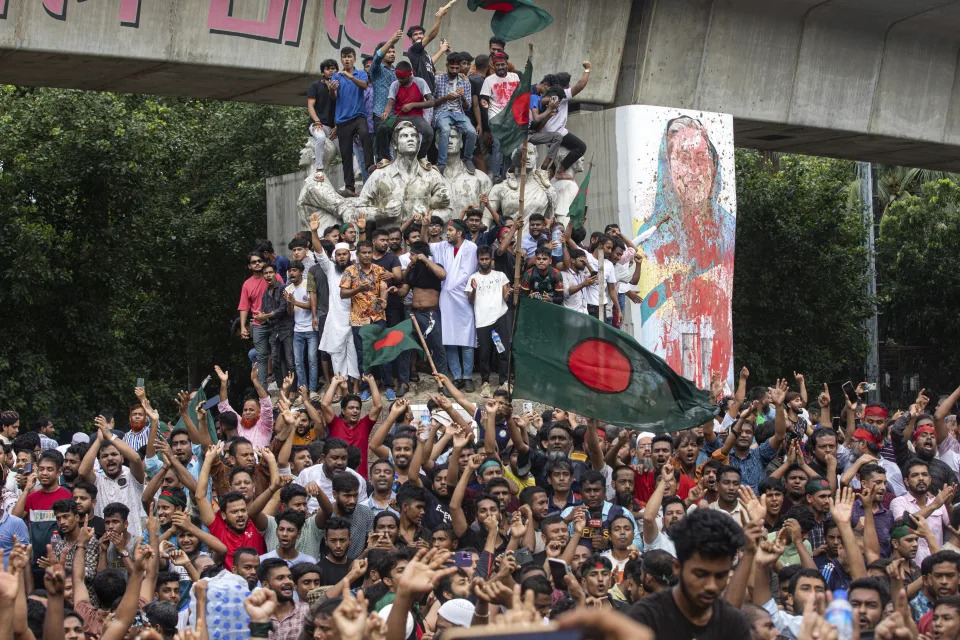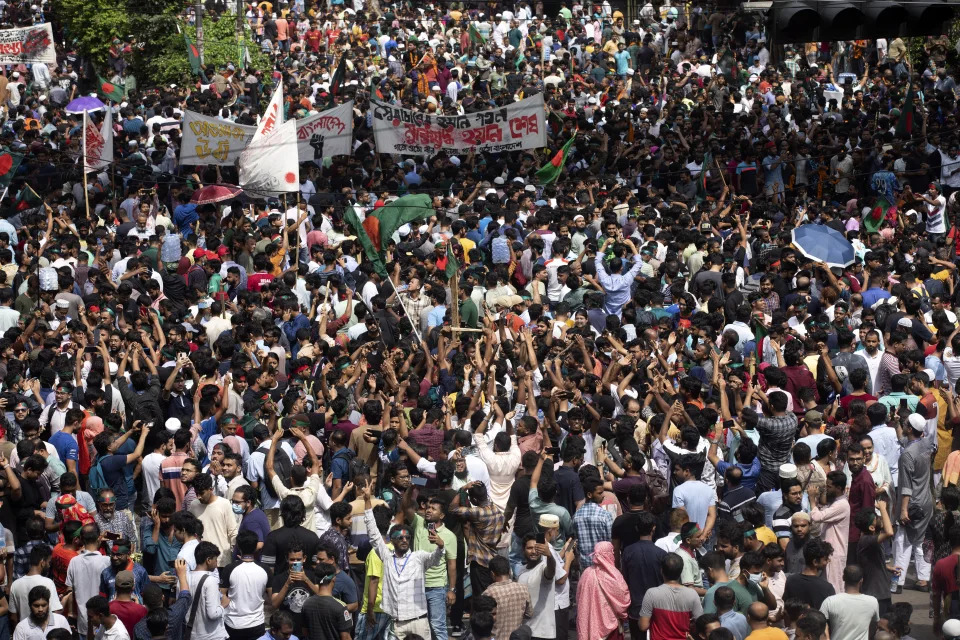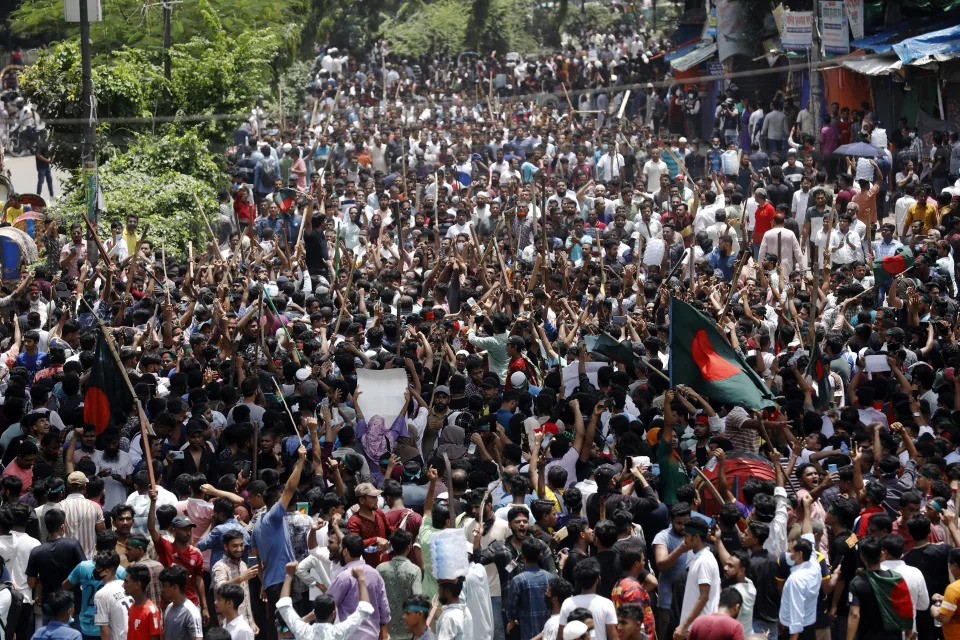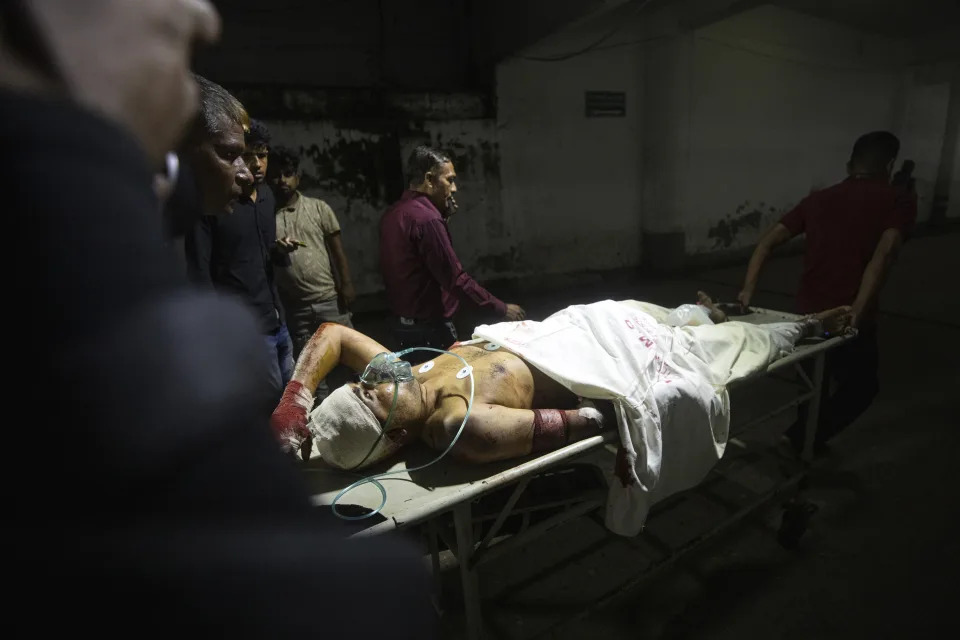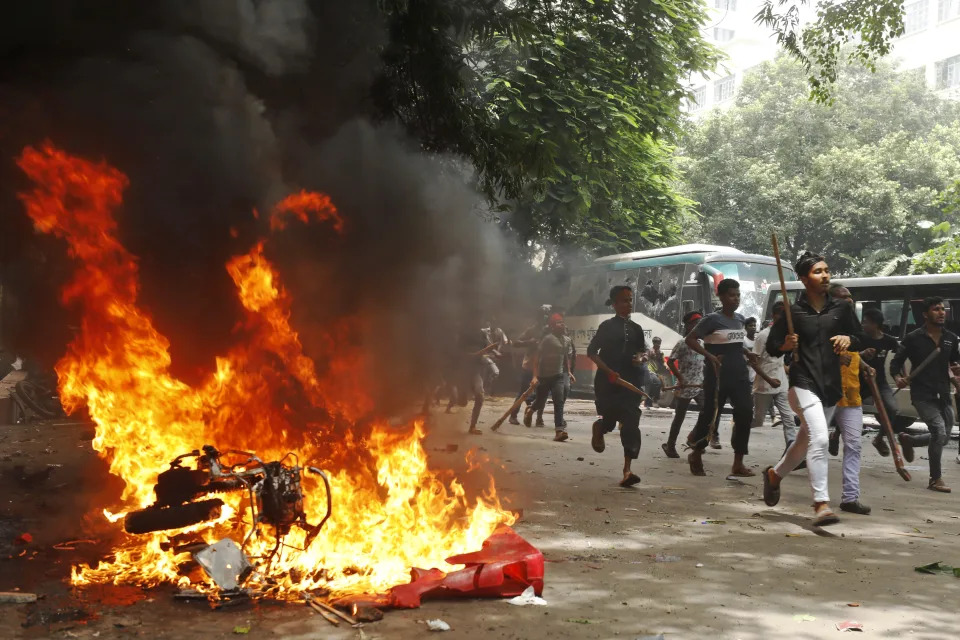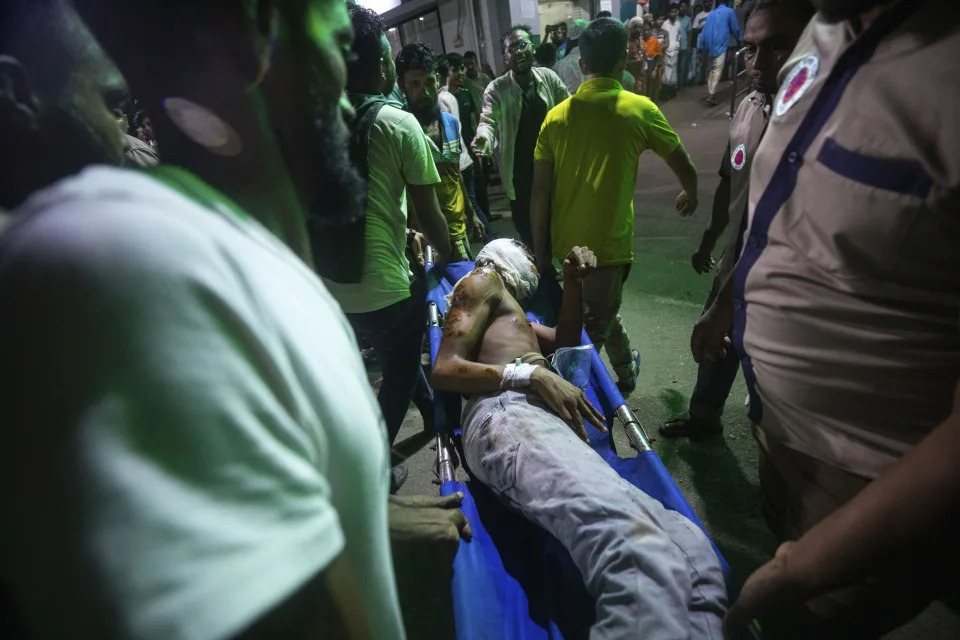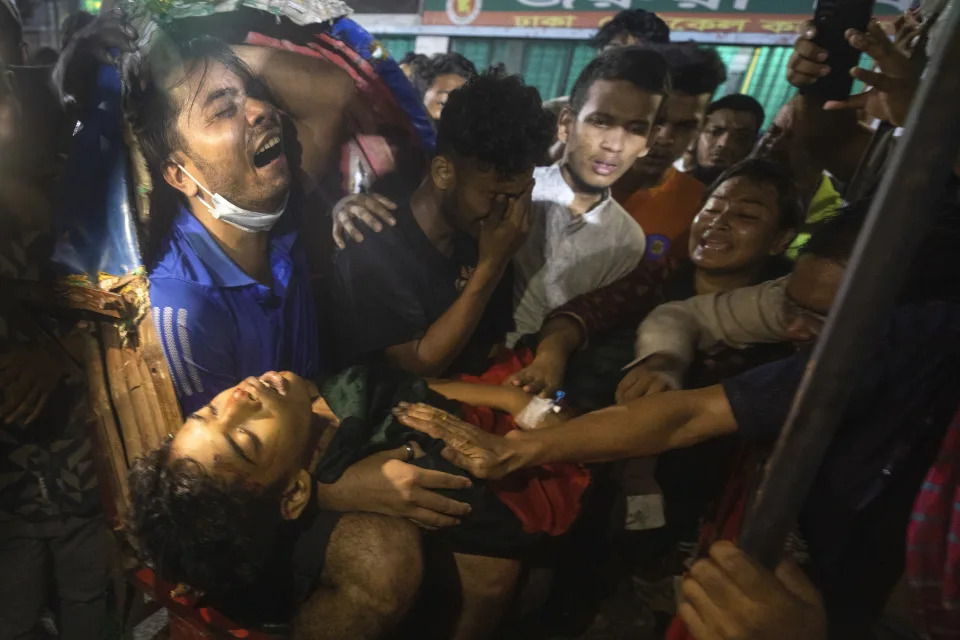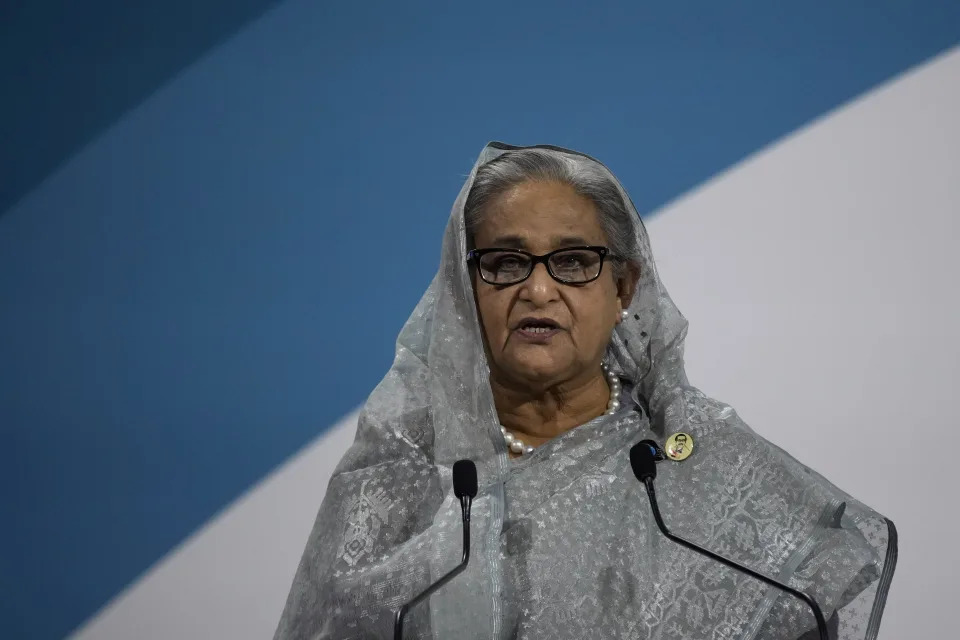‘…like a dictator’: Bangladesh Nobel laureate Muhammad Yunus reacts to Sheikh Hasina's resignation
ByHT News Desk
Aug 06, 2024
Bangladesh Nobel laureate Muhammad Yunus accused Sheikh Hasina of anti-democratic practices and destroying her father Sheikh Mujibur Rahman's legacy
Nobel laureate Muhammad Yunus described Bangladesh as a “free country” after Sheikh Hasina was forced to resign as prime minister and flee the country after weeks of violent anti-quota protests that finally demanded her resignation.
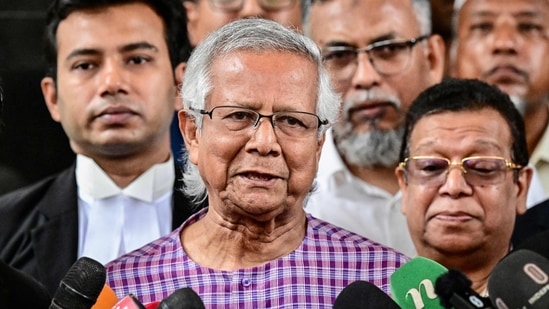 Nobel peace laureate Muhammad Yunus (C) speaks to the media after filing an appeal for the extension of his bail (File image)(AFP)
Nobel peace laureate Muhammad Yunus (C) speaks to the media after filing an appeal for the extension of his bail (File image)(AFP)
“We were an occupied country as long as she (Sheikh Hasina) was there. She was behaving like an occupation force, a dictator, a general, controlling everything. Today all the people of Bangladesh feel liberated,” Muhammad Yunus told ThePrint in an interview.
Get Unlimited access to Hindustan Times E-paper and Archives at 1199/- per year
Also read | Bangladesh Army chief unveils plan to restore ‘normalcy’ in country
Muhammad Yunus, who has been charged by the Awami League government in over 190 cases, accused the fleeing Sheikh Hasina of destroying her father, ‘Bangabandhu’ Sheikh Mujibur Rehman's legacy.
The economist is known for his expertise in microfinance and has his work had lifted lakhs of people out of poverty. Once seen as Sheikh Hasina's potential rival to the country's prime ministership, she accused him of “sucking blood” from the poor.
The 2006 Nobel Peace Prize winner was convicted on charges of embezzling $2 million (more than 16 crore rupees) from the workers welfare fund of Grameen Telecom, one of several firms he founded.
Muhammad Yunus said violence and vandalism by the protesters is the expression of anger against Sheikh Hasina and “an expression of damage she has done”. He also expressed hope that the same students and young people will be leading Bangladesh in the right direction in future.
Also read | Sudden escalation, losing grip caught Sheikh Hasina off-guard
Muhammad Yunus explained that seething anger against Sheikh Hasina could not be expressed in a political way due to a series of rigged general elections. “So that came out as a simple demand for quota changes. It immediately caught up because the government behaved the same way, attacking them rather than listening to them because they are not in a listening mood at all,” Yunus told The Print.
The professor is not sure of what role the opposition party will play as they never had a chance to fairly contest the general elections. Main opposition party Bangladesh National Party (BNP) led by ex-prime minister Khaleda Zia, who will be released after Hasina fled, has been under constant attack from the government.
Yunus, currently on bail, hoped to see a lot of changes once a fair general election is held in Bangladesh. As an advice, he asked Bangladeshis to be wary of past mistakes and stick to democratic principles. "As long as we stick to that you remain a strong country. We can be a beautiful country,” he added.
According to The Daily Star, Yunus has accepted a proposal by the coordinators of the protest movement to make him the chief advisor of the soon to be formed interim government.
ByHT News Desk
Aug 06, 2024
Bangladesh Nobel laureate Muhammad Yunus accused Sheikh Hasina of anti-democratic practices and destroying her father Sheikh Mujibur Rahman's legacy
Nobel laureate Muhammad Yunus described Bangladesh as a “free country” after Sheikh Hasina was forced to resign as prime minister and flee the country after weeks of violent anti-quota protests that finally demanded her resignation.
 Nobel peace laureate Muhammad Yunus (C) speaks to the media after filing an appeal for the extension of his bail (File image)(AFP)
Nobel peace laureate Muhammad Yunus (C) speaks to the media after filing an appeal for the extension of his bail (File image)(AFP)“We were an occupied country as long as she (Sheikh Hasina) was there. She was behaving like an occupation force, a dictator, a general, controlling everything. Today all the people of Bangladesh feel liberated,” Muhammad Yunus told ThePrint in an interview.
Get Unlimited access to Hindustan Times E-paper and Archives at 1199/- per year
Also read | Bangladesh Army chief unveils plan to restore ‘normalcy’ in country
Muhammad Yunus, who has been charged by the Awami League government in over 190 cases, accused the fleeing Sheikh Hasina of destroying her father, ‘Bangabandhu’ Sheikh Mujibur Rehman's legacy.
The economist is known for his expertise in microfinance and has his work had lifted lakhs of people out of poverty. Once seen as Sheikh Hasina's potential rival to the country's prime ministership, she accused him of “sucking blood” from the poor.
The 2006 Nobel Peace Prize winner was convicted on charges of embezzling $2 million (more than 16 crore rupees) from the workers welfare fund of Grameen Telecom, one of several firms he founded.
Muhammad Yunus said violence and vandalism by the protesters is the expression of anger against Sheikh Hasina and “an expression of damage she has done”. He also expressed hope that the same students and young people will be leading Bangladesh in the right direction in future.
Also read | Sudden escalation, losing grip caught Sheikh Hasina off-guard
Muhammad Yunus explained that seething anger against Sheikh Hasina could not be expressed in a political way due to a series of rigged general elections. “So that came out as a simple demand for quota changes. It immediately caught up because the government behaved the same way, attacking them rather than listening to them because they are not in a listening mood at all,” Yunus told The Print.
The professor is not sure of what role the opposition party will play as they never had a chance to fairly contest the general elections. Main opposition party Bangladesh National Party (BNP) led by ex-prime minister Khaleda Zia, who will be released after Hasina fled, has been under constant attack from the government.
Yunus, currently on bail, hoped to see a lot of changes once a fair general election is held in Bangladesh. As an advice, he asked Bangladeshis to be wary of past mistakes and stick to democratic principles. "As long as we stick to that you remain a strong country. We can be a beautiful country,” he added.
According to The Daily Star, Yunus has accepted a proposal by the coordinators of the protest movement to make him the chief advisor of the soon to be formed interim government.
OPINION: Hasina’s exit likely to continue economic crisis and lead to trade slump for Bangladesh
_Cropped_0.jpg)
Former Prime Minister of Bangladesh Sheikh Hasina resigned and left the country on August 5 2024. Hasina who oversaw a harsh crackdown on violent student protests that claimed over 300 lives between June 7 and August 5 2024, was reportedly given a 45-minute ultimatum by her military leadership to resign.
She subsequently left Bangladesh onboard a military helicopter and later boarded a C130 military transport aircraft which landed at India’s Hindan airport in the evening. Hasina is then believed to have travelled further and is likely bound for a final destination in London.
Hasina’s fifteen year tenure in power was largely marked by remarkable economic growth, with Bangladesh becoming one of the fastest-growing economies in Asia. Hasina was also able to establish and balance strong bilateral ties with both India and China despite their rivalry. Her shrewd foreign policy and balanced approach, not only brought in both Indian and Chinese investment to the Bangladesh economy, but also helped its national infrastructure.
However, since 2020, the COVID-19 related economic downturn and its after-effects imposed severe restrictions on the Bangladesh economy and led to several structural problems such as a sharp fall in its foreign reserves, accumulated debt, liquidity issues and lower than expected remittances.
The situation deteriorated further to the extent that Bangladesh had to seek a bailout loan package of $4bn from the International Monetary Fund (IMF). While the IMF approved the loan, it required Bangladesh to adhere to its guidance on implementing several austerity measures, especially in the public finance and power sectors.
These austerity measures were coupled with a constant vigil and repeated monitoring visits by IMF delegations before the release of each tranche of funds from the loan. Yet, while the student protests were directly aimed at a controversial quota reserving a 30% job quota for descendants of Bangladesh’s 1971 liberation war freedom fighters - the underlying issue was public rage against the economic downturn, the sharply rising cost of living and lack of lucrative career opportunities in the country - which was exacerbated by the seemingly unfair quota.
In the first half of 2024, Bangladesh was able to mitigate several of its central economic problems with the implementation of the IMF’s recommendations and subsequently receiving the millions of dollars in tranches of the loan attached to them.
These IMF recommended measures only served to sharply raise prices of essential commodities such as electricity for both households and businesses across Bangladesh, further adding to brewing discontent among the masses.
While the Bangladesh Army Chief of Staff announced that the military would now oversee the transition of power to an interim government after Hasina’s exit, it is unclear to what extent the interim government will be able to preserve the relative stability of its predecessor regime.
If the instability and economic impact of the unrest during the violent student protests are any indicator, the future for Bangladesh doesn’t bode well. Remittances from the Bangladeshi diaspora, denominated in foreign currencies, has been a key source for foreign reserves for the government in Dhaka. How and to what extent this will continue is unknown.
During the protests, the government's brutal crackdown threatened this source as various diaspora organisations called upon all Bangladeshi nationals and people of Bangladeshi origin to refrain from sending funds back to the country in order to pressure the government.
Furthermore, the European Union(EU) which was, until the last week of July in the process of discussing the details of a potential trade deal with Bangladesh, suspended the talks citing excessive use of force by Hasina’s regime and associated human rights concerns. It is now unclear how the EU will perceive the interim government and the successive administration of the country, and if the talks concerning the trade deal will pick up anytime soon.
Bangladesh’s bilateral trade with its neighbours will also likely be affected, at least in the short term - in the process freezing production as well as imports and exports, with an outsized impact on its textile industry.
Bangladesh relies on Indian cotton for its textile industry, the import of which might be disrupted following the unrest and current uncertainty in the country.
Sheikh Hasina’s arrogance led to downfall, says former Bangladesh foreign secretary
Devadeep Purohit Calcutta Published 06.08.24

Shamser Mobin Chowdhury, former foreign secretary of Bangladesh.
Shamser Mobin Chowdhury, former Bangladesh foreign secretary who had also been the ambassador to the US and Germany, spoke to The Telegraph after Prime Minister Sheikh Hasina resigned and Bangladesh was pushed to the brink of political uncertainty.
Q: Street protests, coups, failed coups and sudden regime change are not new in Bangladesh. Did the country witness anything like this before?
Chowdhury: This was not a military coup per se. The army was made to step in. They spoke to the Prime Minister and conveyed that they could not defend her anymore, which resulted in her resignation.
Something similar had happened to H.M. Ershad on December 6, 1990, when the army generals told him to step down.
Q: Can the uprising against Ershad be equated with what happened to Hasina?
Chowdhury: One cannot forget two key differences between December 1990 and August 2024.
First, the movement against Ershad was championed by two main political leaders in the country — Awami League’s Sheikh Hasina and BNP’s Khaleda Zia. This time, the students led the movement.
Second, Ershad was not forced to leave the country and he even contested the general elections held in February 1991. This time, an elected Prime Minister had to flee the country and the air force facilitated her exit.
Q: Did you expect that the Hasina government would crumble like this?
Chowdhury: The general mood in the country was, something has to happen. But frankly, I could sense only this morning that something like this would happen.
Q: Some images from Dhaka depict a sense of relief among the people. Wasn’t Hasina liked by the people?
Chowdhury: Her government fell due to the pent up anger. Look at the way she handled the quota protests in which at least 300 people were killed. She antagonised lakhs of people, who lost their near and dear ones, with her insensitive comments. Even when she agreed to talk to the protesters, she said, if they want, I am willing to sit with them. This is arrogance.
Her dismissive attitude towards anything and everything — including her senior cabinet colleagues — led to her fall. One person cannot run the government of 170 million people.
Q: An interim government will replace the Awami League regime. Do you think it will result in a return to normalcy?
Chowdhury: I don’t think it will happen overnight. More than 300 lives were lost. I don’t know how these wounds can be healed.
Besides, the interim government is likely to be a mixture of progressive and non-progressive forces.
So, I am not sure how smooth the transition would be.
Q: What would be the biggest challenge facing the interim government:
Chowdhury: Maintaining stability and order in the society.

